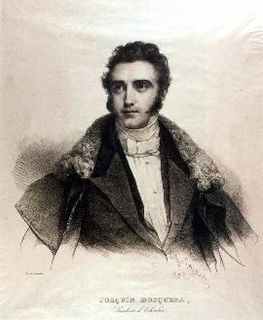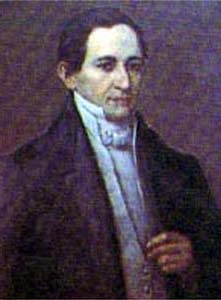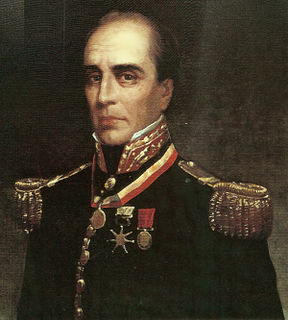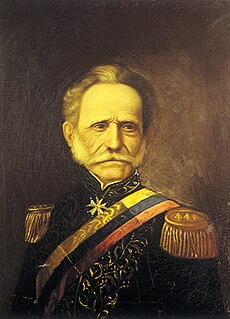
Tomás Cipriano Ignacio María de Mosquera-Figueroa y Arboleda-Salazar was a Colombian general and political figure. He was president of Colombia four times. The first time was as president of Republic of New Granada from 1845 to 1849. During the Colombian Civil War of 1860–1862 he led liberal forces in a civil war against conservative factions. After the liberals won, a new, federalist constitution was implemented, which established a two-year presidency, and the nation renamed the United States of Colombia. Mosquera served twice as president of the new government. From 1861 to 1862 he served in a non-elected, interim manner, while the constitution was written. From 1862 to 1864 he served in an elected manner. He had a fourth term from 1866 to 1867. Due to the liberal reforms carried out under his leadership, he is considered one of the most important persons in Colombian history of the 19th century.

Luis Antonio Herrera Campins was President of Venezuela from 1979 to 1984. He was elected to one five-year term in 1978. He was a member of COPEI, a Christian Democratic party.
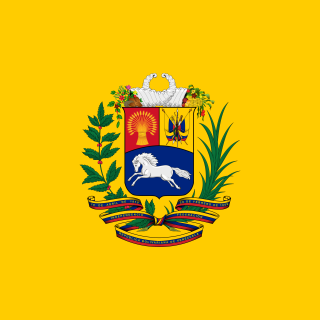
The President of Venezuela, officially known as the President of the Bolivarian Republic of Venezuela is the head of state and head of government in Venezuela. The president leads the National Executive of the Venezuelan government and is the commander-in-chief of the National Bolivarian Armed Forces. Presidential terms were set at six years with the adoption of the 1999 Constitution of Venezuela, and presidential term limits were removed in 2009.

José Miguel Pey y García de Andrade was a Colombian statesman and soldier and a leader of the independence movement from Spain. He is considered the first vice president and first president of Colombia. He was a centralist.

José Hilario López Valdés was a Colombian politician and military officer. He was the President of Colombia between 1849 and 1853.
The War of the Supremes was a civil conflict in Republic of the New Granada from 1839 to 1841 caused by the ambitions of various regional leaders (gamonales) to seize power and depose President José Ignacio de Márquez. It was called the War of the Supremos because of the participation of General José María Obando and other revolutionary gamonales who called themselves jefes supremos.

Pedro Alcántara Herrán Martínez de Zaldúa ) was a Colombian general and statesman who served as President of the Republic of the New Granada between 1841 and 1845. As a general he served in the wars of independence of the New Granada and of Peru.

José Ignacio de Márquez Barreto was a Colombian statesman, lawyer and professor, who served as Vice President of Colombia under the presidency of Francisco de Paula Santander, and subsequently was elected President of the Republic of the New Granada for the presidential term of 1837 to 1841.

José María Ramón Obando del Campo was a Neogranadine General and politician who twice served as President of Colombia. As a General, he initially fought for the Royalist Army during the Independence Wars of Colombia, ultimately joining the revolutionary forces of Simón Bolívar towards the end, but once independence was attained he opposed Bolívar's Centralist government.

The constitutional history of Colombia is the process of formation and evolution of the different constitutions that Colombia has had since its formation.
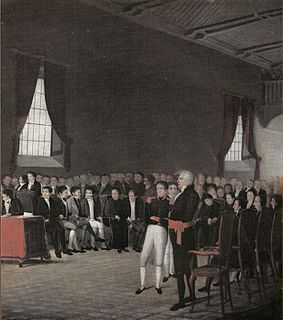
The history of Venezuela reflects events in areas of the Americas colonized by Spain starting 1522; amid resistance from indigenous peoples, led by Native caciques, such as Guaicaipuro and Tamanaco. However, in the Andean region of western Venezuela, complex Andean civilization of the Timoto-Cuica people flourished before European contact. In 1811, it became one of the first Spanish-American colonies to declare independence, which was not securely established until 1821, when Venezuela was a department of the federal republic of Gran Colombia. It gained full independence as a separate country in 1830. During the 19th century, Venezuela suffered political turmoil and autocracy, remaining dominated by regional caudillos until the mid-20th century. Since 1958, the country has had a series of democratic governments. Economic shocks in the 1980s and 1990s led to several political crises, including the deadly Caracazo riots of 1989, two attempted coups in 1992, and the impeachment of President Carlos Andrés Pérez for embezzlement of public funds in 1993. A collapse in confidence in the existing parties saw the 1998 election of former coup-involved career officer Hugo Chávez and the launch of the Bolivarian Revolution, beginning with a 1999 Constituent Assembly to write a new Constitution of Venezuela. This new constitution officially changed the name of the country to República Bolivariana de Venezuela.

José María Rojas Garrido was a Colombian Senator, and statesmen, who as the first Presidential Designate became Acting President of the United States of Colombia in 1866 during the absence of President elect Tomás Cipriano de Mosquera. He was a prominent journalist for several Liberal Party newspapers, and is considered one of the most important orators in Colombia's history.
The First Lady of Colombia is the unofficial title of the spouse of the sitting President of Colombia.

Indirect presidential elections were held in the Republic of New Granada on 9 March 1932. Francisco de Paula Santander was elected president, whilst José Ignacio de Márquez was elected vice president.

Presidential elections were held in the Republic of New Granada in 1833. Francisco de Paula Santander was re-elected President, whilst Joaquín Mosquera was elected Vice President.



